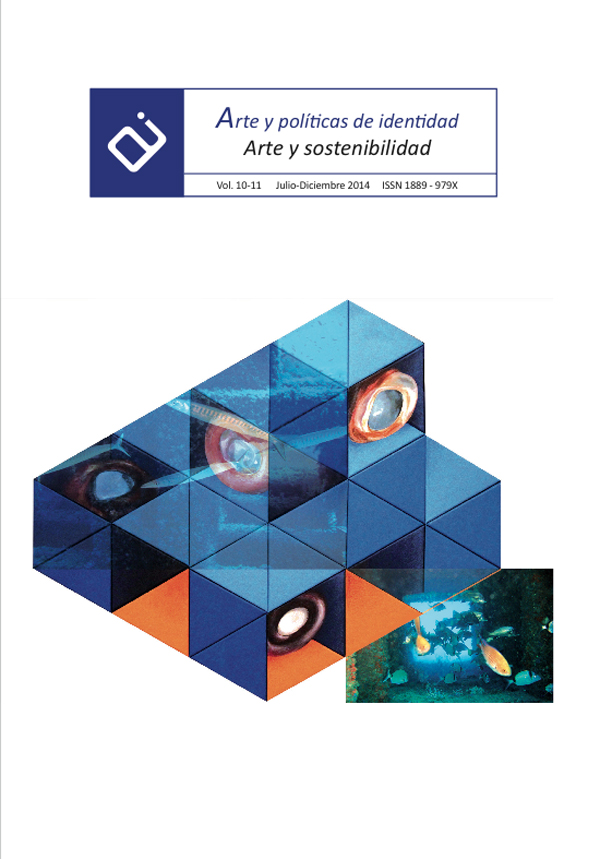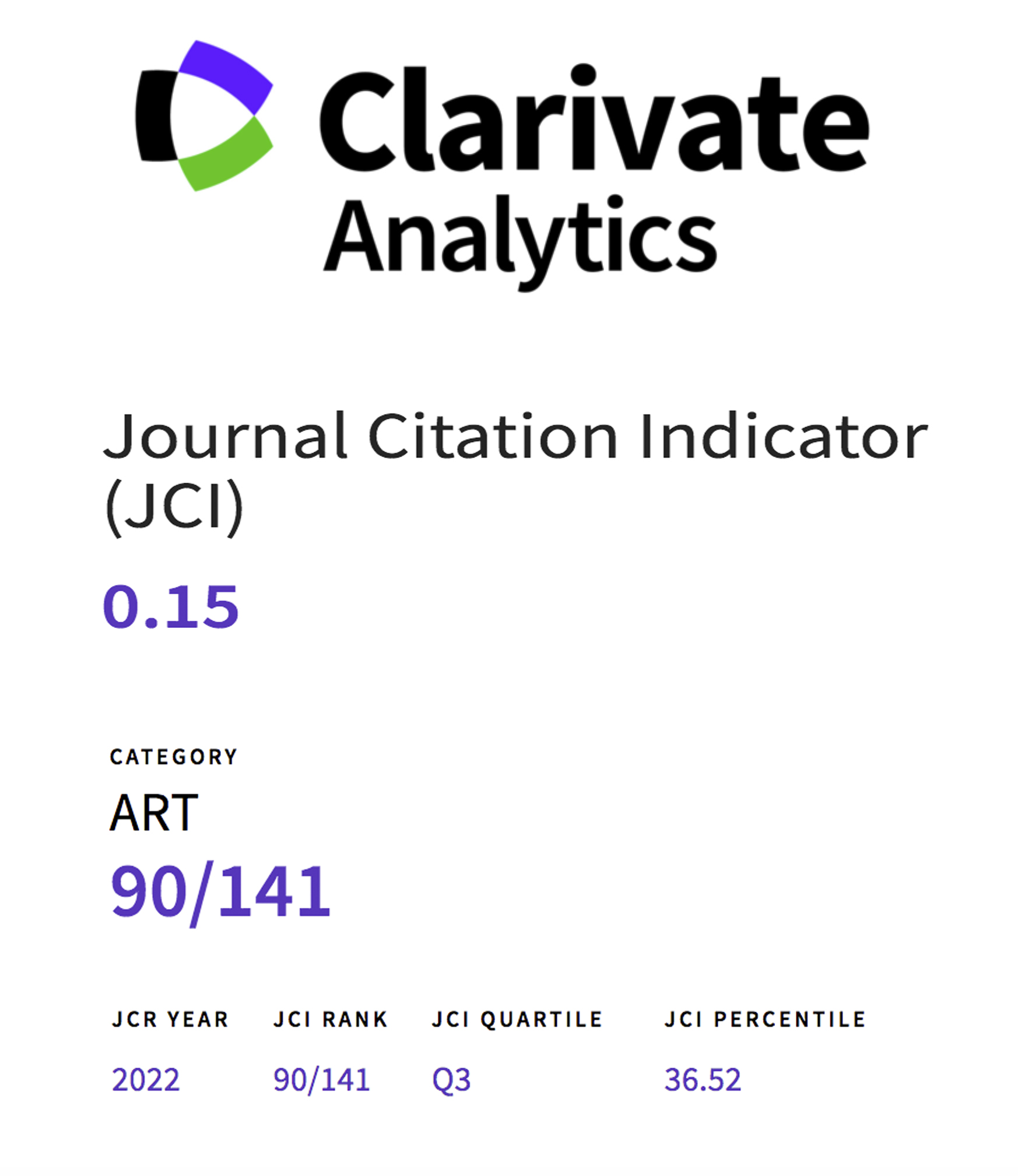Para una ecología de las marcas, arte y control: la nueva era de Homo Cypiens
Abstract
Por causa de la tecnología digital ahora temos una sociedad más vigiada que nunca. El controlo está en forma de red, mas también en forma de narrativa, gráfica e conceputal. Neste artigo a nossa preocupación es debater como la ecología e naturaleza se han tornado un nuevo suelo para el control. E neste contexto, marcas, imagenes corporativas, ambientes criados por el hombre, precisan de enfrentar una crítica moldada por la arte e la teoría. Deste modo assi esperamos mejor reflectir nas características de una nueva e emergente personagen: el homo cypiens. Considerando que el mundo en red parece ligarse a todas as cosas e a toda la gente, lo hay una nueva condición humana modificada por la tecnología. E más do que nunca, as conexiones entre ideias puden ser la solución.Downloads
References
[DVD film] (Michael Anderson, 1956)
- a space odyssey [DVD film] (Stanley Kubrick, 1968)
AAVV (n.d.). Dossier anti-édipo - capitalismo e esquizofrenia. Portugal: Cadernos Peninsulares, Nova série, Ensaio 20
All watched over by machines of loving grace- episode 1. love and power (Adam Curtis, 2011) [Documentary film]
All watched over by machines of loving grace - episode 2. the use and abuse of vegetational concepts (Adam Curtis, 2011) [Documentary film]
Aron, R. (1983). The committed observer [le spectator engagé]. Chicago, US: Regnery Gateway.
Augé, M. (2007). Não-lugares: introdução a uma antropologia da sobremodernidade [1992], Lisbon, Portugal: 90 Graus Editora
Anderson, C. & Wolff, M. (August 17, 2010). “The web is dead. longlive the internet”.Available in http://www.wired.com/2010/08/ff_webrip/all/
Baudrillard, J. (n.d.). A sociedade de consumo [1970]. Lisbon, Portugal: Edições 70
----- (2010). The agony of power [2007]. Intervention series, n 6. Los Angeles, US: Semiotext(e)
Bauman, Z. (2000). Liquid modernity. Cambridge, US: Polity Press
----- (2011). Consuming life [2007]. Malden, Massachussets, US: Polity Press
Blade Runner [DVD film] (Ridley Scott, 1982)
Boym, S. (2001). The future of nostalgia. New York, NY, US: Basic Books
Castells, M. (1999). A sociedade em rede. São Paulo, Brazil: Editora Paz e Terra
Clarke, A. C. (n.d.). 2001 - odisseia no espaço [1968]. Lisbon, Portugal: Edições Europa-America
Crawford, A., Edgar, R. (Eds.) (1997). Transit lounge. North Ryde, Australia: 21.C Interface−Craftsman House
Debord, Guy (1991). A sociedade do espectáculo. Lisbon, Portugal: Edições mobilis in mobileDeleuze, G, (n.d.). “Post-scriptum sur les sociétés de contrôle”. Available in http://aejcpp.free.fr/articles/controle_deleuze.htm (Acedido em 2011)
----- (1974). Lógica do sentido [1969]. São Paulo, Brazil: Perspectiva
----- (2004). On desert islands and other texts [1953-1974]. Los Angeles / New York, US: Semiotext(e)
Deleuze, G, Guattari, F. (s.d.). A thousand plateaus – capitalism and schizophrenia [1987]. London, UK: The Athlone Press
Deleuze, G., Guattari, F. (1996). O anti-édipo – capitalismo e esquizofrenia [1972]. Lisbon, Portugal: Assírio & Alvim
Eagle eye [DVD film] (D.J. Caruso, 2008)
Ecology (Adams, R., Rydingsvard, U. V., Manglano-Ovalle, I., Dion, M.,2013). Art:21 [Season Four, 2007]. In Art in the 21st century. Art:21, Inc.(2013). US: PBS [Documentary film]
Elias, H. (1999). Ciberpunk – ficção e contemporaneidade. Lisbon, Portugal: Dist.Sodilivros
----- (2006). A sociedade optimizada pelos media [the media-optimized society]. Lisbon, Portugal: MediaXXI - Formal Press
----- (2011). “Eco-branding: a revolution in the new media age” in Pires, H. (coord.) “Publicidade - discursos e práticas”, Journal Communication & Society Research Centre, Vol.12 , CECS - Centro de Estudos de Comunicação e Sociedade. Braga, Portugal: Editora Húmus, University of Minho
----- (2013). Post-web: the continuous geography of digital media. Lisbon, Portugal: MediaXXI - Formal Press. Available on Amazon.com.Escape from cybercity (Fathom Pictures, Philips Inter.Media, 1992: CD-I) [videogame]
Flusser, V. (1985). Filosofia da caixa preta.São Paulo, Brazil: Hucitec
Forrester, J. W. (1969). Urban dynamics. US: Pegasus
Fukuyama, F. (2002). The end of history and the last man [1992]. New York, NY, US: Perennial/Harper Colins
Gibson, W. (2010). Zero history. New York, NY, US: G.P. Putnam’s Sons
----- (1995). Neuromancer [1994]. London, UK: Voyager / Harper Collins
Gillmor, D. (2006). We the media. grassroots journalism - by the people, for the people [2004]. California, US: O’Reilly
Hibelings, H. (1998). Supermodernismo – arquitectura en la era de la globalización. Barcelona, Spain: Editorial Gustavo Gili SA
Higgins, H. B. (2009). The grid book. Cambridge-Massachussets, US: MIT Press
Hoepker, K. (2011). No maps for these territories: cities, spaces and archaeologies of the future in william gibson. Amsterdam, Holland – New York, NY, US: Editions Rodopi, BV
Holtzman, S. (1997). Digital mosaics – the aesthetics of cyberspace.New York, NY, US: Simon & Schuster
Howe, J. (2010). Crowdsourcing – como o poder da multidão impulsiona o futuro dos negócios [why the power of the crowd is driving the future of business, 2008]. Lisbon, Portugal: (Conjuntura) Actual Editora
Kelly, K. (2010). What technology wants. New York, NY, Viking
Klein, N. (2002). No logo – o poder das marcas (1999-2000). Lisbon, Portugal: Relógio D’Água
----- (2008). The shock doctrine: the rise of disaster capitalism. New York, NY, US: Picador
-----(2009). A doutrina do choque. Lisbon, Portugal: Smartbook
Laermer, R., Simmons, M. (2008). Punk marketing: junta-te à revolução[2007]. Alfragide, Portugal: Lua de Papel - Leya
Lasn, K. (2000). Culture jamming: how to reverse america’s suicidal consumer binge – and why we must (1999). New York, NY, US: Quill (Harper/Collins)
Leary, T. (1994). Chaos & cyberculture. Berkeley, California, US: Ronin
Lipovetsky, G. (1989). O império do efémero: a moda e o seu destino nas sociedades modernas [1987]. Lisbon, Portugal: D.Quixote
Lipovetsky, G., Serroy, J. (2010). A cultura-mundo: resposta a uma sociedade desorientada [2008]. Lisbon, Portugal: Edições 70
Lost [TV Series] (J.J. Abrams, ABC, 2004-2010)
Lunenfeld, P. (2011). The secret war between downloading & uploading - tales of the computer as culture machine. Cambridge, London, US, UK: MIT Press
Maúl, S. (Trad.) (2011). “O Factor F”. In Marketeer magazine - “Quem vai ganhar com a tdt?”, June, nº 179, pp. 18-22.
McLuhan, M. (1994). Understanding media: the extensions of man[1964]. Massachusetts, US: MIT Press
McLuhan - Gzowski interviews mcluhan (CBC TV, 90 Minutes Live Program, December 13, 1977)
Mcluhan – McLuhan predicts ‘world connectivity’ (CBC TV - Take 30 Program, April 1, 1965)
McLuhan’s wake (Kevin McMahon, 2002)
Miranda, J. A. B. de (1997). “O controlo do virtual”. Available in http://ubista.ubi.pt/~comum/miranda-controlo.html (Access in 2011)
Net, the [DVD film] (Irwin Winkler, 1994)
No maps for these territories [2000] - William Gibson (Mark Neale, 2000) [Documentary film] O tempo e o modo [the time and the manner] - episode 3 - lucrécia martel (Graça Castanheira, 2012, Pop Filmes) [Documentary film]
Odum, E., Barrett, G. W. (2004). Fundamentals of ecology. US Brooks Cole
Orwell, G. (1991). Mil nove centos e oitenta e quatro – 1984 [1948]. Lisbon, Portugal: Antígona
----- (2007). “Nineteen Eighty Four – 1984”. Available in www.online-literature.com/orwell/1984/ (Access in 2011)
Person of interest [TV Series] (Jonathan Nolan, CBS, 2010-11)
Podritske, M., Schwartz, P. (Eds.) (2009). Objectively speaking - Ayn Rand interviewed. New York, NY, US: Lexington Books
Polak, F. (1973). The image of the future. New York, NY, US: Elsevier Publishing Company
Rheignold, H. (2002). Smart mobs: the next social revolution. Cambridge, US: Basic Books - Perseus Publishing
Rheingold, H. (1996). A comunidade virtual. Lisbon, Portugal: Gradiva
Ries, A., Ries, L. (2005). A origem das marcas [2004]. Lisbon, Portugal: Casa Das Letras - Editorial Notícias.
Rifkin, J. (2001). A era do acesso - a revolução da nova economia [2000]. Lisbon, Portugal: Editorial Presença
Schippke, U. (1975). Futuro - imagem do mundo de amanhã [Zukunft]. Barcelona, Spain: Círculo de Leitores
Shock doctrine, the - a doutrina do choque (Mat Whitecross & Michael Winterbottom, 2009) [Documentary film]
Slaughter, R. (1997). “Psych-fi”, pp.32-37 in Crawford, A. & Edgar, R. (Eds.) (1997). Transit lounge. North Ryde, Australia: 21.C Interface−Craftsman House
Stephenson, N. (1993). Snow Crash [1992] London, New York: Penguin Books
Sterling, B. (1986). Mirrorshades – reflexos do futuro. Lisbon, Portugal: Livros do Brasil
Sugimoto, Y. (1997). An introduction to japanese society. New York, NY, US: Cambridge University Press
Toffler, A. (n.d.). O choque do futuro [1970]. Lisboa: Livros de Brasil
----- (1984). A terceira vaga [1980]. Lisbon, Portugal: Livros do Brasil
----- (1991). Os novos poderes [1990]. Lisbon, Portugal: Livros do Brasil
Touch [TV Series] (Tim Kring, 2012)
THX 1138 [Director’s Cut] [DVD film] (George Lucas, 1971)
Turkle, S. (2011). Alone together – why expect more from technology and less from each other. New York, NY, US: Basic Books
Virilio, P. (1991). The aesthetics of disappearance [1980]. US: Semiotext(e)
----- (1999). La bombe informatique. Paris, France: Galilée
----- (2000). Cibermundo: a política do Pior.Lisbon, Portugal: Teorema
Wiener, N. (1965). Cybernetics or the control and communication in the animal and the machine. Massachussets, US: MIT Press
----- (1988). The human use of human beings: cybernetics and society.US: Da Capo Press
Works published in this journal are subject to the following terms:
- The Service of Publications from the University of Murcia (publishing house) keeps the published works’ copyrights, and favors and allows the reuse of these works under the license indicated in point 2.
- Works are published in the journal’s online edition under the license Creative Commons Reconocimiento-NoComercial-SinObraDerivada 3.0 España(texto legal). They can be copied, used, disseminated, transmitted and publicly exhibited, as long as: i) the author and original source of publication are cited (journal, publishing house and work’s URL); ii) they are not used for commercial purposes; iii) the existence and specifications of this license are mentioned.
3. Conditions for auto-file. It is allowed and encouraged that authors share electronically their pre-print version (the pre-reviewed version) and /or post-print version (the reviewed and accepted version) of their Works before the publication, since it promotes its circulation and dissemination. RoMEO color: green.









